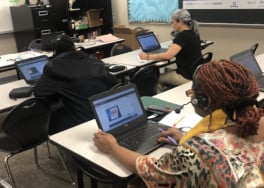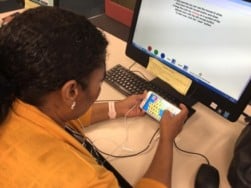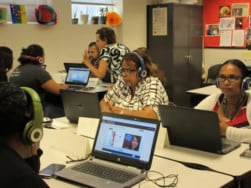Learning Together, Online – Highlights from English Now! Learning Circles
March 21st, 2022 | Blogs
What the learning circle model provides is twofold; flexibility around barriers and a reconstruction of “expert”. More student choice and voice exists in this model, giving students the skills to assert themselves in community, education, and work settings.”
The English Now! (EN!) Learning Circles project has hosted learning circles with over 20 project partners across 10 states over the past five years. EN! started with a pilot program of five programs in 2016 and encouraged by its success and impact, we have since scaled up the program model across the United States with participation from adult education programs located in community-based programs, union halls, and libraries. All in all, approximately 700 learners have participated in learning circles over the past five years. English Now! has been generously funded by the Dollar General Literacy Foundation for the pilot and the scale-up phases of this project.
In English Now! blended learning circles, English Language Learners (ELLs) come together in a small group setting led by a facilitator. The intention is to build a supportive community that facilitates online and peer-to-peer learning. For the online learning piece, programs use a variety of online platforms such as independent courses like USA Learns, apps such as Cell-Ed, EnGen or Burlington English, or a free library course such as Universal Class. A typical 90-minute weekly learning circle session agenda includes a 15-minute check-in; 50 minutes of online learning; an in-person activity where learners can practice their language skills, and a 10-minute wrap-up. However, this agenda is flexible and programs modify it to suit the needs and interests of the learners.
The initial goal of the EN! pilot project was to expand access to learning opportunities for English ELLs on waiting lists for English classes and demonstrate learning gains for those participating in learning circles. Programs have found that learning circles appeal not only to those on waiting lists but also to those who cannot attend regularly scheduled English classes because of other obligations. Over time, our goals for learning circles expanded to include: increasing learners’ comfort with using computers and mobile apps for learning, building digital skills including participating in virtual classes and in using online course materials and apps, increasing readiness for formal ESOL courses, and building leadership skills.

Before the latest cohort of programs got started, the COVID-19 pandemic hit. Our program partners who had signed up to participate in EN! wondered how a virtual learning circle might work. Would learners in a virtual environment feel the support of their peers, be able to take on leadership roles, and have the digital skills needed to both log into a class and use an online course for learning?
Using their knowledge and experience for delivering virtual classes, five intrepid EN! program partners successfully implemented learning circles in virtual learning settings over a 16-month period. Learning circle facilitators and their programs approached the virtual learning circle in different ways. Some found that learners were ready to use an online learning platform, usually with onboarding assistance from the program. Others, where most students were using mobile phones to log into the learning circle, decided to simplify the learning by having the facilitator share the online platform, while also encouraging the learners to study English using an online course or apps outside of the session. All found that learners came to depend on the learning circle group time for support given the crisis we were all living through. This grant enabled the programs to experiment with remote learning in a more relaxed, low stakes environment.
With an intermediate to low advanced group of learners, Lindsay Southworth from the Free Library of Philadelphia, where they used the library’s Universal Class resource in one learning circle and We Speak NYC in another, said this, “We used a flipped-classroom approach, with participants completing online lessons and activities on their own during the week and then meeting for weekly learning circle sessions, where we explored online learning resources together and shared challenges, successes, and questions about the content covered in the week’s lesson.” Read her blog account here.
Genesis Center in Providence, RI, loaned students computers and showed them how to access the pre-loaded Zoom account and USA Learns website so that the facilitator, Yexcica Cappas Santiago was able to use multiple websites right from the start. She describes her experience here. Bonnie Taylor, the Genesis Center Education Director of Day Programs, offers her view of learning circles, “Our past offering model had specific time/space requisites for students, based on state funding requirements and our own internalized ideas of what makes education high quality. It was an extension of a classic educational model of experts giving knowledge to novices. Often, multiple barriers could/would keep students out of our classes. What the learning circle model provides is twofold; flexibility around barriers and a reconstruction of “expert”. More student choice and voice exists in this model, giving students the skills to assert themselves in community, education, and work settings.”

Still another program, the TJACE program at Piedmont Virginia Community College, pivoted from using the Cell-Ed app in the face-to-face learning circle to developing a guest speaker program to address learners’ questions and concerns related to the COVID-19 pandemic. The virtual guest speakers included public health officials with information about COVID-19 testing and vaccine registration, college support staff with information about food banks and other financial resources, and a mental health counselor who shared stress management techniques. As the year progressed, learners requested speakers who would address their interests like gardening or visiting local parks and historic sites, evidence of this learning circle’s healing journey together.
Now that we’ve found that the learning circle model can be used in a virtual or in-person setting, this gives programs more options. There are advantages and benefits of online learning for adults such as ease of attending classes, lower childcare and transportation costs, and an overall better work-life balance. English Now! programs surveyed their student bodies and 62-75% of learners indicated they wanted a virtual option for learning English. Learning circles that meet once a week are an affordable option for programs who want to respond to that learner demand.

If you’d like to start a blended learning circle, whether in-person or virtual, please peruse our updated English Now! Implementation Guide which includes guidance for programs for planning and implementation, and additional in-depth information for facilitators. There are downloadable resources for in-person and remote learning circles including lesson plans, learner welcome materials, a list of online courses to consider, and more!
We want to thank all our program partners that have contributed to our understanding of what makes learning circles work. David Rosen, who has been an advisor on the project and a champion of learning circles, interviewed and wrote about six of the EN! programs which reveal the many ways learning circles benefit programs and learners. ProLiteracy, with guidance and feedback from World Education, is offering a three-part course on learning circles for administrators and facilitators on their learning platform. Programs can use the courses to train volunteers or teachers who are interested in leading learning circles .
The support of the Dollar General Literacy Foundation has made for a successful experience that our EN! programs are now motivated to continue on their own and we hope you will try a learning circle as well.
Further questions about English Now! Learning Circles? Please contact Kathleen O’Connell at kathleen_oconnell@worlded.org.
View a recording of the national webinar from February 8th featuring our program partners Free Library of Philadelphia, Genesis Center, Literacy DuPage, Thomas Jefferson Adult Career Education at Piedmont Virginia Community College, and theLiteracy Council of Montgomery County discussing the English Now! implementation playbook and how participants can adapt the model within their own contexts and programs.
World Education fosters enduring partnerships across regions and sectors to advance education outcomes for all. We offer education systems strengthening, program design and implementation, applied research and evaluation, capacity development, and policy development services.